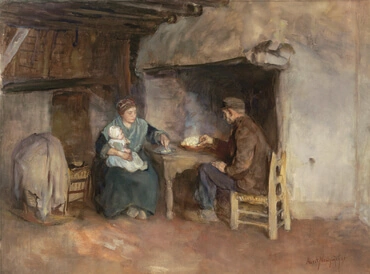1
QUESTE son le parole del patto, che il Signore comandò a Mosè di fare co’ figliuoli d’Israele nel paese di Moab; oltre al patto ch’egli avea fatto con loro in Horeb.
2
Mosè adunque chiamò tutto Israele, e disse loro: Voi avete veduto tutto quello che il Signore ha fatto davanti agli occhi vostri, nel paese di Egitto, a Faraone, e a tutti i suoi servitori, e a tutto il suo paese;
3
le prove grandi che gli occhi tuoi hanno vedute, que’ miracoli e gran prodigi.
4
Or il Signore, infino a questo giorno, non vi ha dato cuor da conoscere, nè occhi da vedere, nè orecchi da intendere.
5
E io v’ho condotti quarant’anni per lo deserto; i vostri vestimenti non vi si son logorati addosso, e il vostro calzamento non s’è logorato ne’ vostri piedi.
6
Voi non avete mangiato pane, nè bevuto vino, nè cervogia; acciocchè conosceste ch’io sono il Signore Iddio vostro.
7
Alla fine voi siete giunti in questo luogo; e Sihon, re di Hesbon, e Og, re di Basan, sono usciti incontro a noi in battaglia, e noi li abbiamo sconfitti;
8
e abbiam preso il lor paese, e l’abbiam dato in eredità a’ Rubeniti, e a’ Gaditi, e alla mezza tribù di Manasse.
9
Osservate adunque le parole di questo patto, e mettetele in opera; acciocchè facciate prosperar tutto ciò che farete.
10
Oggi voi comparite tutti davanti al Signore Iddio vostro, i vostri Capi, le vostre tribù, i vostri Anziani, e i vostri Ufficiali, e tutti gli uomini d’Israele;
11
i vostri piccoli fanciulli, le vostre mogli, e il tuo forestiere che è nel mezzo del tuo campo, fino a colui che ti taglia le legne, e colui che ti attigne l’acqua;
12
per entrar nel patto del Signore Iddio tuo, e nel suo giuramento, il quale il Signore Iddio tuo fa oggi teco;
13
per istabilirti oggi per suo popolo, e acciocchè egli ti sia Dio, com’egli te n’ha parlato, e com’egli giurò a’ tuoi padri, ad Abrahamo, a Isacco, e a Giacobbe.
14
Or io non fo questo patto, e questo giuramento, con voi soli;
15
anzi, tanto con chi è qui con noi, e comparisce oggi davanti al Signore Iddio nostro, quanto con chi non è oggi qui con noi;
16
perciocchè voi sapete come siamo dimorati nel paese di Egitto, e come siamo passati per mezzo le nazioni, per le quali siete passati.
17
E avete vedute le loro abbominazioni, e i loro idoli di legno, di pietra, d’argento, e d’oro, che sono appresso di loro.
18
Guardatevi, che non sia fra voi uomo, o donna, o famiglia, o tribù, il cui cuore si rivolga oggi indietro dal Signore Iddio nostro, per andare a servire agl’iddii di quelle nazioni; che non vi sia fra voi radice alcuna che produca tosco ed assenzio;
19
e che non avvenga che, avendo alcuno udite le parole di questo giuramento, si benedica nel cuor suo, dicendo: Io avrò pace, benchè io cammini secondo la pravità del mio cuore; per aggiungere ebbrezza alla sete.
20
Il Signore non vorrà perdonargli; anzi allora, l’ira del Signore e la sua gelosia fumeranno contro a quell’uomo; e tutte l’esecrazioni scritte in questo Libro si poseranno sopra lui; e il Signore cancellerà il suo nome disotto al cielo.
21
E il Signore lo separerà d’infra tutte le tribù d’Israele, a male; secondo tutte l’esecrazioni del patto scritto in questo Libro della Legge.
22
Onde la generazione futura, i vostri figliuoli che sorgeranno dopo voi, e il forestiere che verrà di paese lontano diranno, quando vedranno le piaghe di questo paese, e le sue infermità, delle quali il Signore l’avrà afflitto;
23
e che tutta la terra di esso sarà solfo, salsuggine ed arsura; e che non sarà seminata, e che non produrrà nulla, e che non vi crescerà alcuna erba: qual fu la sovversione di Sodoma, di Gomorra, di Adma e di Seboim; le quali il Signore sovvertì nella sua ira, e nel suo cruccio;
24
anzi pur tutte le nazioni diranno: Perchè ha fatto il Signore così a questo paese? quale è l’ardor di questa grand’ira?
25
E si dirà: Perciocchè hanno abbandonato il patto del Signore Iddio de’ lor padri il quale egli avea fatto con loro, quando li ebbe tratti fuor del paese di Egitto;
26
e sono andati, e hanno servito ad altri dii, e li hanno adorati; dii, i quali essi non aveano conosciuti; e i quali il Signore non avea lor dati per parte.
27
Laonde l’ira del Signore si è accesa contro a questo paese, per far venir sopra esso tutte le maledizioni scritte in questo Libro;
28
e il Signore li ha stirpati d’in su la lor terra, con ira, con cruccio e con grande indegnazione; e li ha cacciati in un altro paese come oggi appare.
29
Le cose occulte sono per lo Signore Iddio nostro; ma le rivelate sono per noi, e per li nostri figliuoli, in perpetuo; acciocchè mettiamo in opera tutte le parole di questa Legge.







